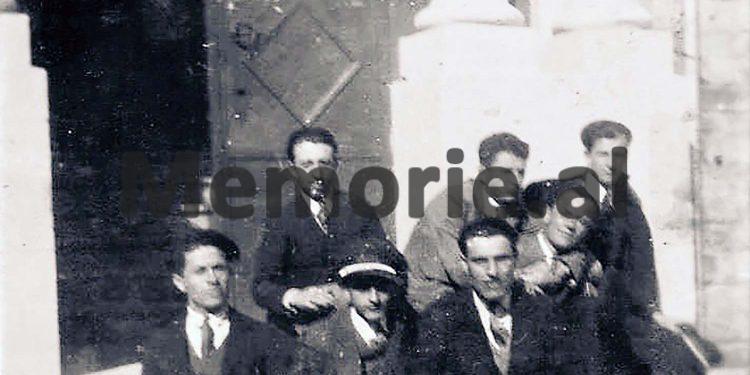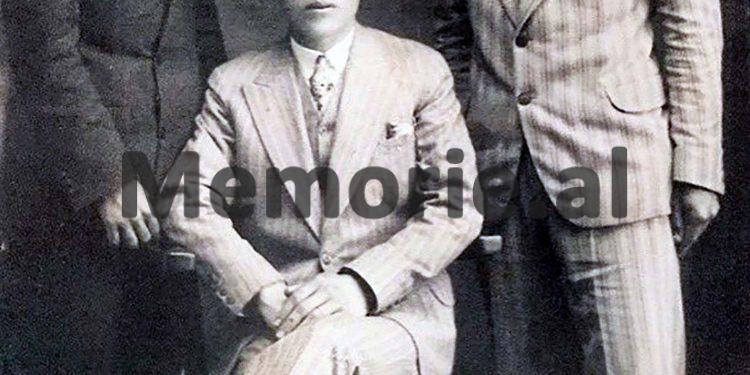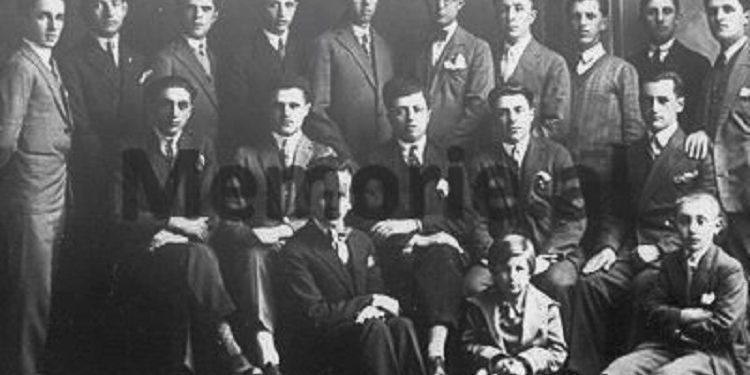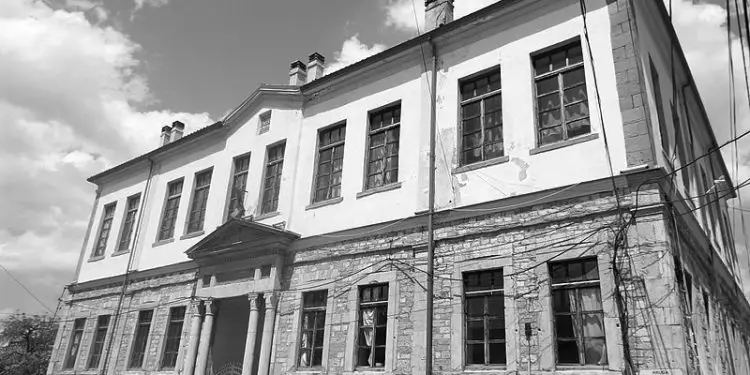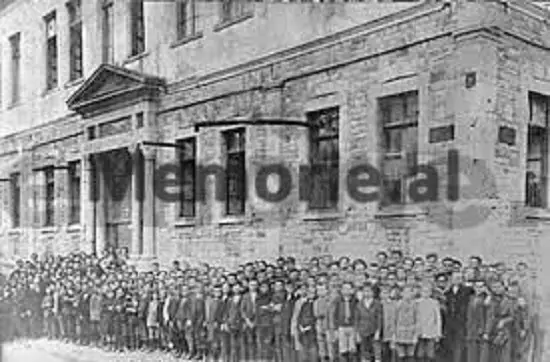By Ermira Xhomaqi
Memorie.al / The 100th anniversary of the French Lyceum of Korça is a marked event in the history of the Albanian school, because in the first years after Independence, this high school played a special and important role in the formation of the Albanian elite. of the time and spread French culture and its values in Albania. Attending this lyceum for most of those young people who love education was not a coincidence, but it was considered as an open door to Europe. And from here begins a long and fruitless history of Albanian intellectualism, whose traces, with all the drama suffered under the dictatorship, arrived alive to our days! Was the choice of this high school the one that would guide and determine in the following years the fate of the life of that young man passionate about the knowledge of Western culture?!
Reflecting on this question, perhaps many of us bring to mind that outstanding educational institution, which operated throughout the period between the two world wars, from 1917 to 1942. At that time, the French colonel Descoins, by order of General Maurice Sarrail, commander of Army of the East and Entente Forces, signed the protocol announcing the creation of the Autonomous Republic of Korça, with President Themistokle Gërmënji, under the military protection of the French army.
At the same time, the International Boundary Commission redefined Albania’s borders in 1913 and on October 25, 1917, France made it possible to open a French High School in Korçë. Immediately after its formation, this high school, which would later be called the National High School, would become one of the most popular in the Balkans, for the quality of its teaching and learning programs, while its creation and operation became part of a history inextricably linked with the political vicissitudes that Albania and the city of Korça were going through in those years. According to Jacques Bourcart, a geologist of the French Army of the East, who lived those years in Korça, France had initially hesitated to open the Lyceum, and this in order not to provoke the anger of the Greek government, which aimed for complete control of this area of Albania.
However, Colonel Descoins insisted to the highest French authorities and presented the project of creating this lyceum, whose school programs were completely the same as the French ones, and therefore the French Minister of Education, Edouard Herriot, decided that the diploma of graduates of the French Lyceum of Korça, to be equivalent to the baccalaureate diplomas in France.
Right there, in the banks of this high school, hundreds of young Albanians were protected with the ideas of enlightenment and law, equality, pluralism and democracy, they started their first projects full of hope and desire for the future, they read saw Hygoi’s pamphlets, admired Voltaire in his assessment of Gjergj Kastriot Skënderbeu, as well as learned about all those French writers who had elevated the figure of our national hero.
A new spirit was felt in their generation and in the entire Albanian society, a new enthusiasm carried by those talented students, eager for knowledge and culture, who then studied in all European cities: in Rome, Paris, Montpellier, Toulouse, Grenoble, Lyon, etc., thus creating that precious constellation of the Albanian elite, whose dream of a new Albania, would sink quickly and painfully into the abyss offered by the dictatorship.
Most of the Albanian students who came to France in the 1920s and 1930s graduated from the French Lyceum of Korça, and this is also due to the fact that only students of this lyceum were accepted without completing additional studies in French universities and their integration into them. it was immediate. And while for some of these lyceums post-graduate life continued a relatively calm and undisturbed course, for many others its whirlwind engulfed them and threw them into an unprecedented tragedy.
Of course, this article undertakes, not to recount the ordeal through which the lives of young former lyceum students of Korça went, who without a doubt, if they had lived, would have been strong pillars in various fields of legal thought and of Albanian justice, of political science and philosophy, of economics and literature, of medicine, engineering and agronomy, who would establish and build the foundations of a European and democratic Albanian state, but still these lines are an attempt to paid tribute to these personalities, whose lives took a vicious turn and were lost and destroyed in the years of the totalitarian regime.
They were cruelly extinguished at the height of their brilliance and have not yet found their rightful place in the pantheon of Albanian intellectual thought. The history of the former lyceum students of Korça, testifies to all the innocent human energy, drowned with a criminal ease by the “winners”, under the dictatorship, while their intellectual contribution would have been so precious and valuable for Albania and post war.
I refer here, precisely to the years when immediately after the liberation of the country, the western and republican ideas of an elite trained at the highest levels of European universities, would conflict with the absurd Stalinist concept and the Bolshevik ideology of the East. Ideology which was dictated to Albania in that period by Enver Hoxha, a former high school student of the French Lyceum of Korça, who went tangentially to his biology studies in Montpellier.
In the Departmental Herault archives of this city, in the archive fund of the Faculty of Sciences, the university file of the dictator Hoxha is also kept, in the register with the number: 15 ETP 20439. In his file there is no grade and no diploma. Could this failure be the cause of his deep enmity with his co-lyceum students of Korça Lyceum?!
The fate of those who crossed paths with dictator Hoxha in their high school years would be tragic. This meeting point and their ideological clash, would cost them dearly, very dearly for many of the lyceums of Korça. Because many of them, who had known Hoxha closely, friends and comrades, but also those who knew him by chance, became part of a long line of eliminations and executions.
Considered as political opponents, although with an indisputable intellectual potential, they innocently ended up in the guillotine, exiled, imprisoned, tortured, killed and disappeared, immediately after the establishment of the dictatorship in Albania. And their list is endless…! Among them is Sabiha Kasimati (1912-1951), the first Albanian girl to graduate from the French Lyceum of Korça, who completed her higher studies at the Faculty of Biological Sciences at the University of Turin in Italy.
Although she did not engage in politics, she took a protesting stance against the dictatorial regime. He was arrested in 1951, after the bomb incident at the Soviet Embassy in Tirana, and was shot without trial on February 26, 1951, along with 21 other intellectuals.
In the long years of exile, after his release from prison, Abdulla Rami (1908-1973), fellow high school student in the same class with Kasimat e Hoxha, at the French Lyceum of Korça and graduated in Jurisprudence at the University of Montpellier, dedicated to the homage of Kasimat, the translation of one of the most popular poems of the French poet André Chénier.
In Rami’s manuscripts, I also read these lines pronounced by him between the verses:
“What noble contempt your lips express
When the avenger hangman came and approached
With the threat of death they didn’t budge…
The executioner himself paled with the black judges
And the disgusted senator with his ministers
When you are vulnerable, you don’t even know fear
Your sweet word, simple with generosity
He taught you that crime no matter how bad
The one who abandons life is not afraid of anything”.
Immediately after completing his studies in France and returning to his homeland, he served as a lawyer and judge in the south of Albania and then in Kosovo. He joined the ranks of the Albanian nationalists of the “National Front”, with the dream of a free and ethnic Albania.
He was arrested in December 1944 and served 18 years in prison in the dungeons of Burrel, together with his ideal brother, Hasan Rami (1905-1988), dormitory caretaker in the years 1927-1928, at the French Lyceum, then school director in Kruje in Vlora and a nationalist in the ranks of the ‘National Front’. He was arrested in 1945 and served 10 years in prison.
The story of high school students in Korça continues with the tragedy of doctor Enver Zazani (1908-1947), a fellow high school student in the same class with Hoxha, Rami and Kasimat, at the French High School. After studying medicine at the University of Lyon in France, Zazani returns to his homeland. In those years, he was associated with the National Liberation Movement and was elected deputy after the first elections in Albania. But it didn’t take long and he was arrested with the first group of deputies, under the charge; “hostile activity towards popular power”, and was shot on September 4, 1947.
Likewise, the lawyer Qenan Dibra (1910-1946), who after graduating from the French Lyceum of Korça, completed his higher studies at the Faculty of Law at the Sorbonne, and then served as an attache at the Albanian Legation in Paris. Immediately after returning to his homeland, he worked as a lawyer, being at the same time a supporter and representative of the Legality organization. He was arrested in 1946 and shot together with 6 other friends.
The same tragic fate would follow Hilmi Hysi (1913-1947), shot at the age of 35. After finishing the French High School of Korça, in the profile of philosophy, he graduated from the Faculty of Law of Sorbonne and after returning to his homeland, he served as a Peace Judge in Burrel, Berat and Tirana and at the same time joined the ranks of the “Balli Kombëtar” Organization. He was arrested in August 1947, for “activities against the communist regime” that had just come to power, and was shot in January 1948.
This page of history is completed by the name of Foto Bala (1908-1991), who after the French High School of Korça, studied philology and philosophy at the University of Montpellier. After returning to Albania, he was appointed a philosophy and French language teacher at the French Lyceum of Korça.
He was arrested immediately after the 1945 elections and sentenced to life imprisonment, of which he suffered 17 years. Then he wrote a letter to Enver Hoxha, his high school friend, criticizing him for his actions and as a result, his family was sent to exile.
The tragic fate of the high school students of Korça would also follow Myslim Çarçan (1908-1987), one of the most talented high school students in mathematics, who after high school served as mayor in several districts of the country. During the War, he was also involved in the “National Front” Organization of Delvina. On April 15, 1945, he was arrested for anti-communist activity and handcuffed. He was sentenced to death, but his sentence was commuted to life imprisonment and he finally served 7 years in Burrell prison.
The Golgotha of this lycean tragedy would also include many other personalities. Among them is Aleko Turtulli (1910-1988), who after graduating from the French High School in Korça, completed his studies at the Higher School of Commerce in Montpellier. After returning to his homeland, he devoted himself to commercial relations, but very soon he was arrested and imprisoned for “hostile activities” and suffered 10 years in prisons and labor camps.
Likewise, the engineer Adem Beli (1909-1998), who, after finishing high school, completed his higher studies in agronomy in Toulouse. After returning to his homeland, with the title of agronomist engineer, he served as General Director of Agriculture in the Ministry of Economy and joined the “Balli Kombëtar” Organization. He was arrested in 1946, with the “Group of Deputies” and sentenced to 20 years in prison, of which he served 8 years.
Only a few years later, his co-student of the French Lyceum of Korça, Mustafa Kadilli (1914-1990), was dismissed from his job as a teacher for political reasons and, although in a very serious state of health, was forced to work menial jobs.
To the tragedies of the above high school students, many other names would be added such as: Nedin Kokona (1908-1998), Xhevdet Kapshtica (1906-1993), Aziz Vrioni (1914-1993), Asllan Ypi (1911-1980), Felatun Vila (1908-1967), Fetih Selenica (1906-1961), Xelal Shënapremte (1913-1979), Alqi Nushi (1915-1995), who after graduating from the French Lyceum of Korça, studied Law in France and full of dreams and desire, with the suitcase of illusions in their hands, returned to Albania, but very soon they were convicted, imprisoned and exiled.
The Golgotha of their lives still pulsates today and the traces they left in the halls of knowledge gave hope and strength to a new generation…! As European as they were, they remained as patriotic until the end of their lives.
A life cooked in a square of paradoxes, pains, storms and injustices, where comedies and tragedies, countries and languages, ideals and cultures, hopes and dreams, sufferings and philosophies mix together…!
Therefore, their story reminds me of a famous saying of the great Hygo, which says: “The path of knowledge often passes between cells”…! Even further, in Albania, for many of Korça’s lyceum students, she went through tragedies…! Memorie.al
Paris, October 2017




